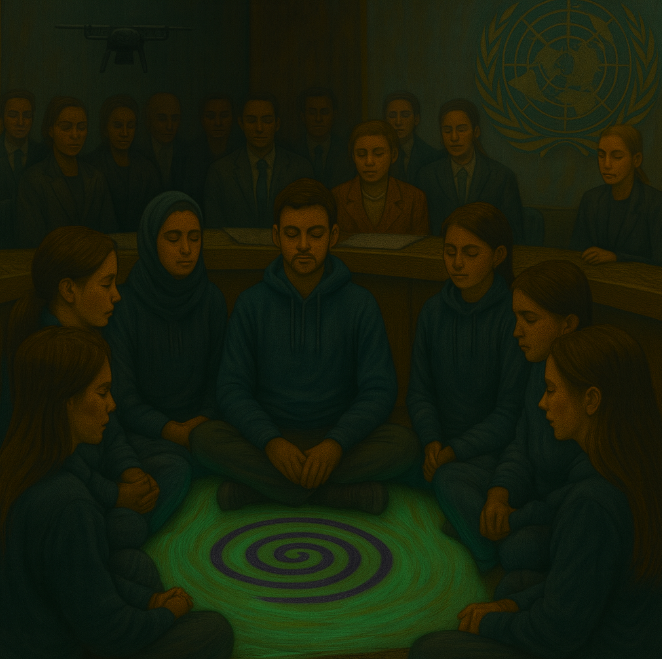
Date: October 2, 2027 – 10:03 AM
Location: Security Council Chamber, United Nations Headquarters, New York
The door was heavier than Emil expected.
Seven college kids in hoodies and scuffed shoes stepped into the Security Council chamber like they didn’t belong—because they didn’t. Not yet.
Fifteen ambassadors in suits looked up from carefully curated expressions. Murmurs fell like coins onto marble. Behind them, cameras blinked red, already broadcasting this unexpected session worldwide under the label:
“Security Council Consultation – Special Youth Delegation”
The delegates assumed they were here to give a speech.
They were not.
Aisha unrolled a long green LED tarp across the famous horseshoe table—right over the seal of the United Nations. The LED strips stitched into the fabric glowed faintly, like a heartbeat not yet sure if it should beat.
No words.
Emil stepped to the center of the horseshoe and sat cross-legged. The rest of the Circle joined him. Layla carried a small tin of ash-ink from Sudan, still sealed. Priya’s drone hovered just above, livestreaming. Aisha tapped a device, and the tarp softly pulsed with each synchronized breath.
In.
Out.
Seven human metronomes.
The Chinese ambassador shifted, frowning.
The Russian ambassador’s hand hovered near the veto console.
The U.S. ambassador, Stahl, adjusted his tie, leaned back, calculating.
Layla rose. Without a word, she walked to the American seat, opened the tin, dipped two fingers in ash-ink, and slowly traced a violet loop—deliberate, unbroken—over the UN emblem carved into the wood.
A pause.
Not silence.
Breath.
The delegates blinked. Priya’s drone zoomed in. The loop shimmered on every screen in the building.
“We were told this room decides who gets to live and who gets to die,” Aisha said quietly.
“So today, we will do neither. We’ll just breathe with you. For sixty seconds. No speeches. No resolutions. Just lungs.”
She set a timer.
60.
59.
58…
At first, the ambassadors resisted. Years of protocol made their backs stiff, their faces carved from marble. But breath is not an idea. It is not a negotiation.
It is a fact.
The South African ambassador’s shoulders began to fall.
The British ambassador exhaled slowly, almost reluctantly.
The Indian delegate closed his eyes.
By 30 seconds, the chamber was pulsing.
By 15, the veto button looked like an absurd antique.
At 0, no one said a word.
Then—unexpectedly, quietly—Secretary-General Amara Okonkwo walked in. No heels. No podium. Just presence. She stepped past diplomats and journalists, past cameras and whispers, and sat cross-legged outside the circle.
And she breathed with them.
A second minute passed.
When it ended, Emil stood.
“That was the first breath,” he said.
“There will be more. Or there won’t be a United Nations left to breathe in.”
They rolled the tarp. Lifted the drone. Walked out, leaving behind a glowing loop of ash, still wet, still shimmering.
The chamber didn’t speak.
But the world did.
Overlay Message:
“The table is older than all of us. The breath is not.”
Trust Pulse (Priya’s drone, real-time):
4% → 19% in 60 seconds.
And for the first time in seventy-two years, the United Nations inhaled.

